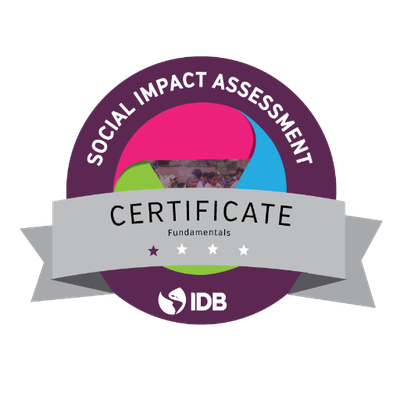Social Impact Assessment 16th. Edition
Puede obtener esta insignia si completa con éxito el curso.
SOBRE ESTE CURSO
Social Impact Assessment (or SIA) is the process of analyzing, monitoring, and managing the social consequences of a planned intervention, such as a program, project, plan, or policy. The SIA process should be reflected in project decision-making at all stages of a project cycle, to maximize the benefits and minimize the social cost of an intervention.
The SIA process includes specific milestones, deliverables, reports, and plans at appropriate times during the project cycle.
In this course, you will learn about the ten elements of an SIA and how to use them during the preparation and implementation of your project. The objective of the course is to effectively evaluate if the elements of a Social Impact Assessment have been implemented in a project in accordance with the guidelines presented in Section I of the international good practice, Social Impact Assessment: Integrating Social Issues in Development Projects, prepared by the IADB in 2018.
The course summarizes international good practice. It discusses the rationale, principles, and recommended approach in undertaking an SIA, stressing that the SIA is a process that should be included in project preparation, implementation, and monitoring, rather than a single study or report. It clarifies that the level of effort and content involved in undertaking an SIA should be proportionate to project risk, scale, and complexity. It also describes the ten elements of an SIA, with strong emphasis on risk identification and management.
AUDIENCIA DEL CURSO
• Acrobat software for viewing and downloading documents;
• Have a reliable internet connection;
• Own and manage a personal email account;
• Good command of English, both written and spoken
COSTOS Y REEMBOLSOS
ESTRUCTURA DEL CURSO
Introduction to the course and pre course test (20 minutes)
Ten elements of SIA (50 minutes)
- Overview
- Element 1: Clarify legal and normative foundation
- Element 2: Assess social context
- Element 3: Conduct stakeholder analysis and meaningful engagement
- Element 4: Identify benefits and opportunities
- Element 5: Identify risks
- Element 6: Determine indicators, baseline, and data collection methodology
- Element 7: Reflect social issues in project design and implementation
- Element 8: Produce and disclose documents
- Element 9: Embed social issues within the project management system
- Element 10: Monitor, adaptive management, and evaluation
- Summary
course assessment (3 case studies) and post course test (30 minutes)
